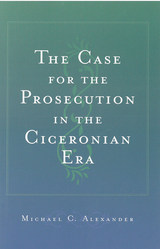
Guided by Cicero's argument, Michael C. Alexander recreates the prosecution's case against the defendants in the trials.
Organized into eleven chapters, each detailing one trial, the core of the work discusses the different dimensions of each trial, the circumstances surrounding the cases, those involved, the legal charges and allegations made by the prosecution, the ways in which the prosecution might have countered Cicero's rebuttal and the outcome. There is also a discussion concerning particular problems the prosecution may have faced in preparing for the trial. This book reveals strong points in favor of the prosecution; justifies the hope of the prosecutor, a private citizen who had volunteered to undertake the case; and asks why the prosecutors believed they would come out victorious, and why they eventually failed.
The Case for the Prosecution in the Ciceronian Era draws on ancient rhetorical theory and on Roman law to shed light on these events. It will interest historians and classicists interested in Ciceronian oratory and those intrigued by legal history.
Michael C. Alexander is Associate Professor of History, University of Illinois, Chicago.
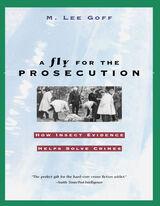
The forensic entomologist turns a dispassionate, analytic eye on scenes from which most people would recoil--human corpses in various stages of decay, usually the remains of people who have met a premature end through accident or mayhem. To Lee Goff and his fellow forensic entomologists, each body recovered at a crime scene is an ecosystem, a unique microenvironment colonized in succession by a diverse array of flies, beetles, mites, spiders, and other arthropods: some using the body to provision their young, some feeding directly on the tissues and by-products of decay, and still others preying on the scavengers.
Using actual cases on which he has consulted, Goff shows how knowledge of these insects and their habits allows forensic entomologists to furnish investigators with crucial evidence about crimes. Even when a body has been reduced to a skeleton, insect evidence can often provide the only available estimate of the postmortem interval, or time elapsed since death, as well as clues to whether the body has been moved from the original crime scene, and whether drugs have contributed to the death.
An experienced forensic investigator who regularly advises law enforcement agencies in the United States and abroad, Goff is uniquely qualified to tell the fascinating if unsettling story of the development and practice of forensic entomology.
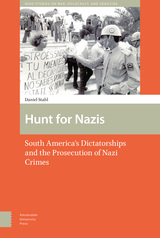
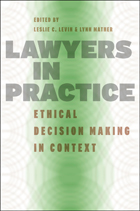
How do lawyers resolve ethical dilemmas in the everyday context of their practice? What are the issues that commonly arise, and how do lawyers determine the best ways to resolve them? Until recently, efforts to answer these questions have focused primarily on rules and legal doctrine rather than the real-life situations lawyers face in legal practice.
The first book to present empirical research on ethical decision making in a variety of practice contexts, including corporate litigation, securities, immigration, and divorce law, Lawyers in Practice fills a substantial gap in the existing literature. Following an introduction emphasizing the increasing importance of understanding context in the legal profession, contributions focus on ethical dilemmas ranging from relatively narrow ethical issues to broader problems of professionalism, including the prosecutor’s obligation to disclose evidence, the management of conflicts of interest, and loyalty to clients and the court. Each chapter details the resolution of a dilemma from the practitioner’s point of view that is, in turn, set within a particular community of practice. Timely and practical, this book should be required reading for law students as well as students and scholars of law and society.
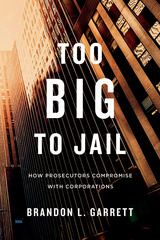
American courts routinely hand down harsh sentences to individual convicts, but a very different standard of justice applies to corporations. Too Big to Jail takes readers into a complex, compromised world of backroom deals, for an unprecedented look at what happens when criminal charges are brought against a major company in the United States.
Federal prosecutors benefit from expansive statutes that allow an entire firm to be held liable for a crime by a single employee. But when prosecutors target the Goliaths of the corporate world, they find themselves at a huge disadvantage. The government that bailed out corporations considered too economically important to fail also negotiates settlements permitting giant firms to avoid the consequences of criminal convictions. Presenting detailed data from more than a decade of federal cases, Brandon Garrett reveals a pattern of negotiation and settlement in which prosecutors demand admissions of wrongdoing, impose penalties, and require structural reforms. However, those reforms are usually vaguely defined. Many companies pay no criminal fine, and even the biggest blockbuster payments are often greatly reduced. While companies must cooperate in the investigations, high-level employees tend to get off scot-free.
The practical reality is that when prosecutors face Hydra-headed corporate defendants prepared to spend hundreds of millions on lawyers, such agreements may be the only way to get any result at all. Too Big to Jail describes concrete ways to improve corporate law enforcement by insisting on more stringent prosecution agreements, ongoing judicial review, and greater transparency.
READERS
Browse our collection.
PUBLISHERS
See BiblioVault's publisher services.
STUDENT SERVICES
Files for college accessibility offices.
UChicago Accessibility Resources
home | accessibility | search | about | contact us
BiblioVault ® 2001 - 2024
The University of Chicago Press









